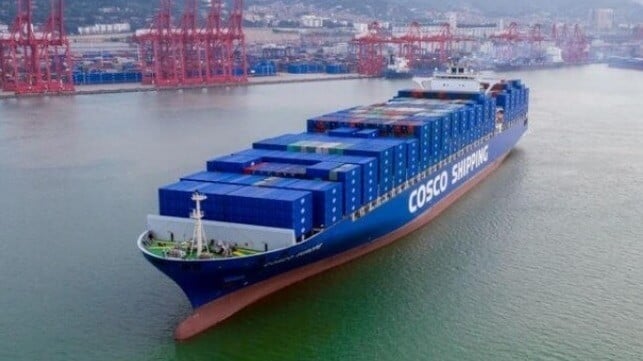Shipping Industry Joins with China Calling for U.S. to Reconsider Port Fees

While recognizing the Trump administration softened the financial impact of its port fees on Chinese-built shipping for many carriers, the shipping industry was quick to respond raising serious concerns after the U.S. Trade Representative’s Office released the structure of the fees. Like the Chinese, the shipping industry asserts that the fees will do little to support the resurgence of U.S. shipbuilding while instead penalizing the U.S. economy and consumers.
The USTR outlined sweeping fees with the costliest targeted at Chinese carriers and while reducing the dollar amounts would also charge all carriers as Chinese-built ships arrive or offload containers. The surprise came with a fee on each vehicle landed from all foreign-built ships, which the World Shipping Council points out encompasses nearly every vehicle carrier in the world. The shipping industry lobbying group calls the fee on car carriers an “arbitrary action” that will slow U.S. economic growth and raise auto prices while doing little to encourage U.S. maritime investment.
“We urge the U.S. to respect facts and multilateral rules and immediately stop its wrong practices,” said Lin Jian, spokesperson for the Chinese Ministry of Foreign Affairs. He said China believes the fees will “disrupt the stability of the global supply chain, and increase inflationary pressure in the U.S., but “ultimately fail to revitalize the U.S. shipbuilding industry.” China highlights the decline of the U.S. shipbuilding industry began in the 1970s.
Trump administration officials were quick to defend the president’s policy and tout the benefits. In an op-ed in the Washington Examiner, Transportation Secretary Sean Duff writes, “The inauguration of a new Trump-era in maritime dominance is a fundamental feature of the golden age of transportation.”
The World Shipping Council while saving it supports the efforts to revitalize the U.S. shipbuilding sector, says “the fee regime announced by USTR is a step in the wrong direction as it will raise prices for consumers, weaken U.S. trade, and do little to revitalize the U.S. maritime industry.”
Joe Kramek, President and CEO of the World Shipping Council, points to serious problems with the structure saying the “backward-looking penalties” would disrupt investment, and risk harming American exporters. Basing the fees on net tonnage, the WSC contends “disproportionately penalizes larger, more efficient vessels that deliver essential goods, including components used in U.S. production lines.”
The WSC also flags “significant legal concerns,” noting that the proposed fees appear to extend beyond the authority granted under U.S. trade law.
“The WSC is urging the administration to reconsider this counterproductive measure, which risks harming U.S. consumers, manufacturers, and farmers without delivering meaningful progress toward revitalizing the U.S. maritime industry,” the group writes in its statement. It instead calls for steps such as targeted investment incentives, infrastructure improvements, and streamlined regulatory processes to strengthen the U.S. maritime sector.

that matters most
Get the latest maritime news delivered to your inbox daily.
China has launched a public relations effort against the U.S. tariffs and highlights that it is taking the lead in lobbying other countries to resist Trump’s tariffs. Foreign Minister Wang Yi warned of unilateral bullying and protectionism in a speech delivered on Thursday hours before the port tariff regime was unveiled. Chinese President Xi Jinping visited Vietnam and Cambodia urging opposing unilateral bullying.
Next week, China is planning Reuters reports informal discussions at the UN Security Council. Reuters says China will accuse the U.S. of bullying.
